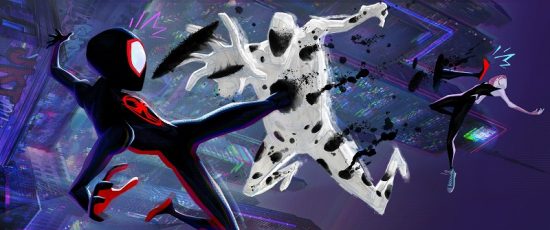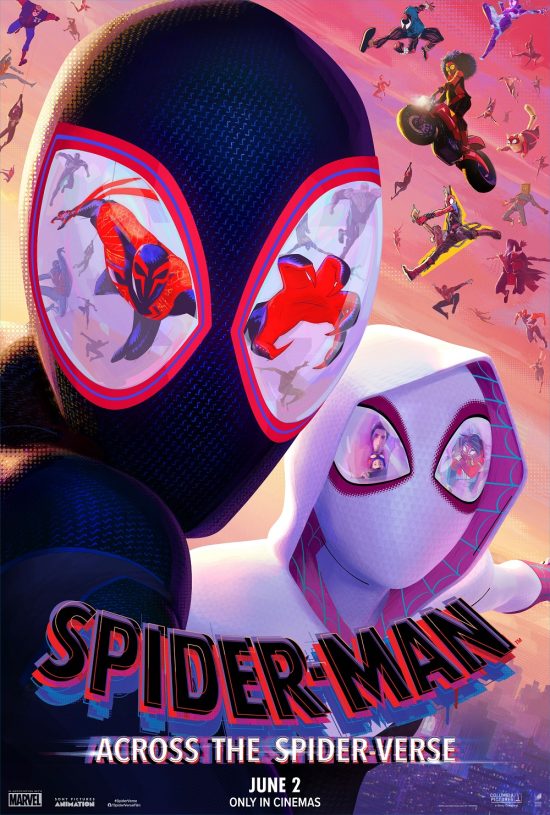Review – Spider-Man: Across the Spider-Verse is a Gwen Stacy Story
It appears that we’ve arrived at the Summer of Superhero Self-evaluation. Archetypes of cinema are now going beyond the fourth wall and entering the fifth dimension (see, the Fast Franchise and Phase 4 of the MCU). Why are they doing this? For some good old-fashioned psychoanalysis. Spider-Man: Across the Spider-Verse is Spider-Man’s Saturn Return.

Gwen Stacy (Hailee Steinfeld) in Columbia Pictures and Sony Pictures Animation’s SPIDER-MAN: ACROSS THE SPIDER-VERSE.
Although the film directly follows on from the events of Spider-Man: Into the Spider-Verse it feels strange using the moniker Spider-MAN to describe the stories in Across the Spider-Verse. This is a film revelling in the many, many Spider-People that have graced comic issue covers since 1962. Writers Lord and Miller (along with writer David Callaham and directors Joaquim Dos Santos, Kemp Powers and Justin K. Thompson) are well aware of that epic canon, and begin the story on one of these alts, bumping Gwen Stacy’s Spider-Woman (wonderfully voiced by Hailee Steinfeld) to co-lead. Gwen is going through some Spider-traditional bad times, having failed to save her Peter Parker and dealing with her cop father (Shea Whigham) who himself is desperate to unmask the caped crusader that ‘murdered’ Peter. Gwen is, understandably feeling pretty low. Then, Gwen’s Earth is invaded by Vulture (if Vulture was drawn by Leonardo da Vinci: graphic artist) closely followed by Spider-Man 2099 (AKA Miguel, voiced by Oscar Isaac), and Jessica Drew (Issa Rae), Spideys from the multiverse here to nab that baddie and put him back in his place. Real-life events force Gwen’s hand, and she joins their inter-dimensional cop squad before the opening credits roll.
Then, we check in with Miles Morales, Brooklyn’s one and only Spider-Man (Shameik Moore), who’s reeling from his uncle’s death and longing to see Gwen again. Instead of planning his educational future and being a present son, Miles has to deal with The Spot (Jason Schwartzmann), a local villain with a grudge against Spider-Man (how vanilla) who’s covered with dimensional holes and is struggling to find his villain vibe (maybe not). Of course, the Spider-Verse would have its villains experiencing crises, it is the most introspective manifestation of an already beloved, tender superhero myth. However, The Spot‘s crisis makes an impact across the Spider-Verse (ahem) leading Miles to reunite with Gwen and together with some new alts (particularly, Daniel Kaluuya‘s Spider-Punk and Karan Sonit‘s Spider-Man India) hop between worlds to save people or sometimes to just…let things happen. Never before has the phrase ‘Wherever you go, there you are” had such resonance, as the collective weight of Spidey existential crises weighs heavily on Miles’s mind. People close to Spider-Man always seem to suffer. Miles dares to challenge that essential tenet, asking, does it have to be this way? Miguel, who, let’s say, has seen some Spidey shit, says yes, but Gwen and Miles, each privately suffering but learning that they’re stronger together, want to try and break the cycle.

Jessica Drew (Issa Rae) in Columbia Pictures and Sony Pictures Animation’s SPIDER-MAN: ACROSS THE SPIDER-VERSE.
The above makes Across the Spider-Verse sound depressing, when it is a laugh-out-loud riot, expertly balancing all this weighty introspection with joy, silliness and a ton of visual gags. About 45 minutes into the film a little kid behind me shouted “this is funny” and they weren’t wrong. Across the Spider-Verse is quite the bonding experience.
And, burying the lede, no words can adequately convey how beautiful the animation looks. It’s like bathing in the warm glow of a thousand prismatic rainbows, as art styles, bops and breakneck transitions pull the viewer through the panels, ever onward. Comic books have long been considered works of art and Across the Spider-Verse brings this thrillingly to life. Very few films can claim to be this gorgeous.
That being said, Across the Spider-Verse is also an exhausting assault upon the senses. When all of life’s woes and joys are thrust together in this vivid form, it makes for a story more affecting than most superhero narratives. The Spideys are constantly in danger, the colours grow brighter, the music pounds. Thankfully, the action pauses to allow the occasional gathering of thoughts before another joke hits. And throughout, Gwen and Miles remain constant, tethered to their feelings as they become untethered to just one universe. Their tender relationship and private agonies are explored with grace, and it’s a really smart choice to directly compare how the two characters deal with similar issues.
The film ends on a cliffhanger, with a third outing, Spider-Man: Beyond the Spider-Verse due in 2024. I can’t wait.












